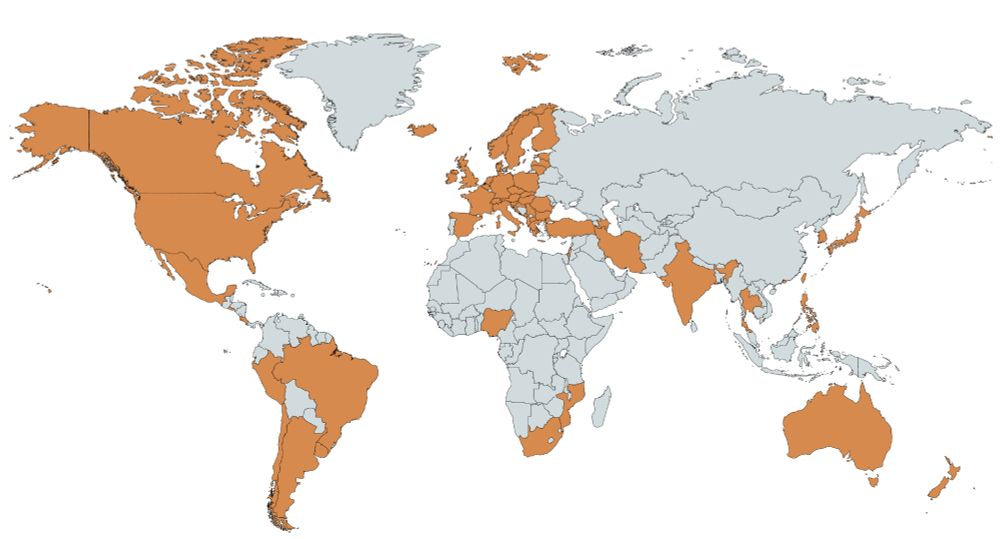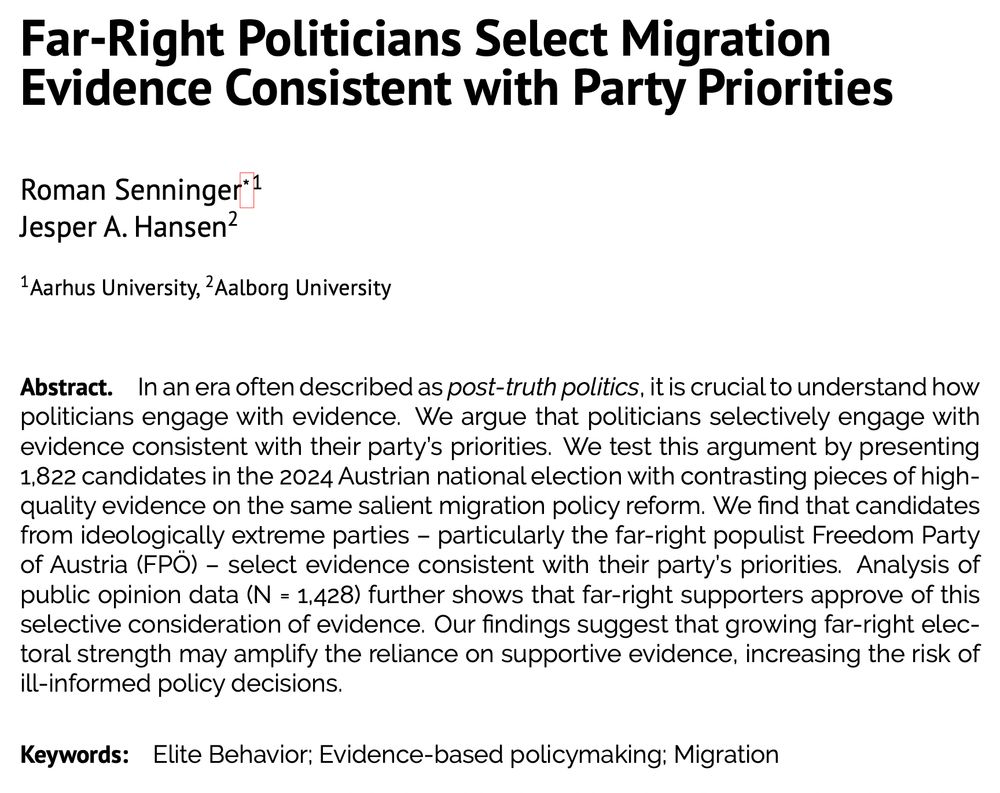🧺 Paper Picnic 2.0 is here! More journals. New features. An easier way to keep up with the latest research in political science and adjacent fields. 🧵👇
27.02.2026 08:21 —
👍 71
🔁 30
💬 1
📌 2
Join us in Aarhus this April! 👇
04.02.2026 07:28 —
👍 4
🔁 1
💬 0
📌 0
Who we are - Center for critical computational studies
Big news: I started a new position as Professor for Computational Social Science (W1 tenure track) at the Center for Critical Computational Studies (C3S) at Goethe University in Frankfurt am Main!
www.c3s-frankfurt.de/who-we-are#m...
02.02.2026 15:34 —
👍 93
🔁 11
💬 13
📌 1

Two three-year postdocs in quasi- or survey-experimental social science.
The Department of Society and Politics at Aalborg University (Faculty of Social Sciences) is recruiting two full-time postdoctoral researchers to work on the...
I'm hiring two three-year postdocs and an RA for my project on how police presence affects perceived safety.
I'm looking for candidates who can contribute to the theoretical development and who have strong expertise in causal inference.
Deadline: March 1.
www.stillinger.aau.dk/videnskabeli...
22.01.2026 12:21 —
👍 12
🔁 10
💬 0
📌 0

We’re organizing a workshop at Aarhus University. Please share and consider submitting!
🗓️ 13–14 April 2026 | 📝 Deadline: Mon, 16 Feb 2026 (extended abstract) — junior scholars prioritized
🎤 Keynotes: @stefwalter.bsky.social (Univ. of Zurich) & @hhuang.bsky.social (Ohio State)
15.01.2026 13:51 —
👍 42
🔁 30
💬 0
📌 3
Research fellow (m/f/d) in the field of “contentious politics/political violence/autocratic politics” - Humboldt-Universität zu Berlin
🚨Job alert! 🚨
I'm advertising a PhD position (66%) in Comparative Politics at HU Berlin. Ideal candidates combine a research interest in autocratic politics, conflict, and/or political violence with strong quantitative methods skills.
⏳ 4 (+2) years | 🗓 DL 16.01; Start March/April 26
More info:
06.01.2026 11:17 —
👍 46
🔁 48
💬 0
📌 3


🇪🇺🇩🇪 Published Today in @bjpols.bsky.social 🇮🇹🇫🇷
How a voting advice application affected voting behavior in three large-scale field experiments:
shorturl.at/2ekBj
TLDR of our study (with @simonhix.bsky.social & @rlachat.bsky.social) below 👇 1/14
18.12.2025 11:40 —
👍 84
🔁 32
💬 5
📌 0

It's out!!
www.science.org/doi/10.1126/...
Big thank you to my coauthors @small-schulz.bsky.social and @lorenzspreen.bsky.social, and to all participants who discussed 20 political issues over 4 weeks in 6 subreddit, 3 experimental conditions and let us observe.
11.12.2025 10:34 —
👍 76
🔁 33
💬 4
📌 2
This sounds extremely interesting. Congrats, Tore!
09.12.2025 14:41 —
👍 1
🔁 0
💬 0
📌 0

Political communication research overwhelmingly relies on text. But parliamentary speech is multimodal! In our new @psrm.bsky.social article, Mathias Rask and I show that legislators also signal partisan conflict nonverbally— through changes in vocal pitch during floor speeches. 🧵 1/11 #polisky
04.12.2025 15:19 —
👍 85
🔁 24
💬 3
📌 1
A gentle summary of the last twenty-odd years of Pearl-style causal inference with DAGs, perhaps most helpful if you're just arriving from old-school philosophy of causation.
I like this genre. And if you do too, I can also recommend Weinberger et al.'s forthcoming piece in BJPS
1/2
30.11.2025 17:37 —
👍 18
🔁 7
💬 1
📌 0
🚨 Please send in your application by 10 December to be considered for this ESRC studentship in collaboration with @campaign-lab.bsky.social. Both home and international students are eligible for funding. Some advice on how to apply below 👇
28.11.2025 21:09 —
👍 22
🔁 22
💬 1
📌 0

🚨 New working paper!
How well do people predict the results of studies?
@sdellavi.bsky.social and I leverage data from the first 100 studies to have been posted on the SSPP, containing 1,482 key questions, on which over 50,000 forecasts were placed. Some surprising results below.... 🧵👇
24.11.2025 15:43 —
👍 94
🔁 42
💬 2
📌 2

A table showing profit margins of major publishers. A snippet of text related to this table is below.
1. The four-fold drain
1.1 Money
Currently, academic publishing is dominated by profit-oriented, multinational companies for
whom scientific knowledge is a commodity to be sold back to the academic community who
created it. The dominant four are Elsevier, Springer Nature, Wiley and Taylor & Francis,
which collectively generated over US$7.1 billion in revenue from journal publishing in 2024
alone, and over US$12 billion in profits between 2019 and 2024 (Table 1A). Their profit
margins have always been over 30% in the last five years, and for the largest publisher
(Elsevier) always over 37%.
Against many comparators, across many sectors, scientific publishing is one of the most
consistently profitable industries (Table S1). These financial arrangements make a substantial
difference to science budgets. In 2024, 46% of Elsevier revenues and 53% of Taylor &
Francis revenues were generated in North America, meaning that North American
researchers were charged over US$2.27 billion by just two for-profit publishers. The
Canadian research councils and the US National Science Foundation were allocated US$9.3
billion in that year.

A figure detailing the drain on researcher time.
1. The four-fold drain
1.2 Time
The number of papers published each year is growing faster than the scientific workforce,
with the number of papers per researcher almost doubling between 1996 and 2022 (Figure
1A). This reflects the fact that publishers’ commercial desire to publish (sell) more material
has aligned well with the competitive prestige culture in which publications help secure jobs,
grants, promotions, and awards. To the extent that this growth is driven by a pressure for
profit, rather than scholarly imperatives, it distorts the way researchers spend their time.
The publishing system depends on unpaid reviewer labour, estimated to be over 130 million
unpaid hours annually in 2020 alone (9). Researchers have complained about the demands of
peer-review for decades, but the scale of the problem is now worse, with editors reporting
widespread difficulties recruiting reviewers. The growth in publications involves not only the
authors’ time, but that of academic editors and reviewers who are dealing with so many
review demands.
Even more seriously, the imperative to produce ever more articles reshapes the nature of
scientific inquiry. Evidence across multiple fields shows that more papers result in
‘ossification’, not new ideas (10). It may seem paradoxical that more papers can slow
progress until one considers how it affects researchers’ time. While rewards remain tied to
volume, prestige, and impact of publications, researchers will be nudged away from riskier,
local, interdisciplinary, and long-term work. The result is a treadmill of constant activity with
limited progress whereas core scholarly practices – such as reading, reflecting and engaging
with others’ contributions – is de-prioritized. What looks like productivity often masks
intellectual exhaustion built on a demoralizing, narrowing scientific vision.

A table of profit margins across industries. The section of text related to this table is below:
1. The four-fold drain
1.1 Money
Currently, academic publishing is dominated by profit-oriented, multinational companies for
whom scientific knowledge is a commodity to be sold back to the academic community who
created it. The dominant four are Elsevier, Springer Nature, Wiley and Taylor & Francis,
which collectively generated over US$7.1 billion in revenue from journal publishing in 2024
alone, and over US$12 billion in profits between 2019 and 2024 (Table 1A). Their profit
margins have always been over 30% in the last five years, and for the largest publisher
(Elsevier) always over 37%.
Against many comparators, across many sectors, scientific publishing is one of the most
consistently profitable industries (Table S1). These financial arrangements make a substantial
difference to science budgets. In 2024, 46% of Elsevier revenues and 53% of Taylor &
Francis revenues were generated in North America, meaning that North American
researchers were charged over US$2.27 billion by just two for-profit publishers. The
Canadian research councils and the US National Science Foundation were allocated US$9.3
billion in that year.

The costs of inaction are plain: wasted public funds, lost researcher time, compromised
scientific integrity and eroded public trust. Today, the system rewards commercial publishers
first, and science second. Without bold action from the funders we risk continuing to pour
resources into a system that prioritizes profit over the advancement of scientific knowledge.
We wrote the Strain on scientific publishing to highlight the problems of time & trust. With a fantastic group of co-authors, we present The Drain of Scientific Publishing:
a 🧵 1/n
Drain: arxiv.org/abs/2511.04820
Strain: direct.mit.edu/qss/article/...
Oligopoly: direct.mit.edu/qss/article/...
11.11.2025 11:52 —
👍 641
🔁 453
💬 8
📌 66
Job! A vacancy at the @eui-eu.bsky.social for a postdoc joining the @learnineq.bsky.social project, for 13 months, starting mid January. We study inequalities in school careers, and we engage with policy makers. The vacancy is here, please forward. DEADLINE 24 NOVEMBER. www.eui.eu/Documents/Se...
05.11.2025 18:11 —
👍 11
🔁 27
💬 1
📌 2
@matthewfacciani.bsky.social, co-author of our latest study on science communication behavior in 68 countries, just published a blog post with a great summary of the main results. Check it out! ⬇️
04.11.2025 19:17 —
👍 6
🔁 1
💬 0
📌 0

We have a new preprint: osf.io/preprints/so...
What have we learned about social media - the constantly moving target of empirical research - over the past decade?
30.10.2025 10:53 —
👍 84
🔁 39
💬 2
📌 4

🌍 Brussels effect or 🪃 boomerang?
Francesca Minetto (@hertieschool.bsky.social) shows that over 20% of EU legislation draws directly on international models, revealing that the EU not only exports but also imports policies 👇
🔗 www.tandfonline.com/doi/full/10....
27.10.2025 13:00 —
👍 7
🔁 4
💬 0
📌 0

Published today: One of the biggest #science #communication studies to date. We asked 71,922 people in 68 countries how they #engage with information about #science and combined the data with several country-level factors: journals.sagepub.com/doi/10.1177/... #OpenAccess
21.10.2025 12:26 —
👍 157
🔁 83
💬 4
📌 11


🚨 We're hiring!
Join our CSES Team @gesis.org Cologne as a Senior Researcher. If you’re into comparative electoral research and love diving into data, this is your moment.
Come shape global democracy with us! 🌍📊
www.gesis.org/en/institute...
16.07.2025 06:09 —
👍 51
🔁 56
💬 1
📌 2
Perhaps @kunkakom.bsky.social (?)
28.06.2025 08:42 —
👍 2
🔁 0
💬 1
📌 0
OSF
A 2023 NHB paper concluded that corrections of science-relevant misinformation are, on average, ineffective. Our response (in press) challenges this conclusion, showing why corrections *are* effective, and why considering measurement is important:
🔗 osf.io/preprints/ps...
(1/5)
27.06.2025 18:56 —
👍 33
🔁 11
💬 4
📌 2
🚨 New working paper 🚨
Can protests move Bystanders, citizens who observe protest without participating?
We tested this in a 3-wave field experiment. Check out our thread below👇🧵
23.06.2025 13:06 —
👍 27
🔁 4
💬 0
📌 0

Very excited to share a new preprint.
@jesperasring.bsky.social and I study how politicians engage with evidence in the real world.
Link: osf.io/8zv9s
20.06.2025 08:26 —
👍 83
🔁 27
💬 3
📌 4
Thanks, Stuart. That is a really nice compliment, especially coming from you. I am always looking at the illustrations in your work and thinking to myself, "Damn, those are good." I really appreciate it.
13.06.2025 11:13 —
👍 2
🔁 0
💬 0
📌 0
Thanks a lot, @mathiaswullum.bsky.social! Really appreciate it. I see a lot of conceptual overlap with your work on citation concentration in the academic space. Would love any feedback you might have, and always open to ideas on where to take the data next!
13.06.2025 11:09 —
👍 1
🔁 0
💬 1
📌 0
Cool data! The Global North is really where expert knowledge is produced.
Not fair, not just, but yes soft power is mostly concentrated there. Wish GN elites cared.
Also: differently from elsewhere, 60% of expert refs in USA docs cite papers with only USA-based academics as authors #exceptionalism
12.06.2025 10:55 —
👍 10
🔁 4
💬 0
📌 0
























